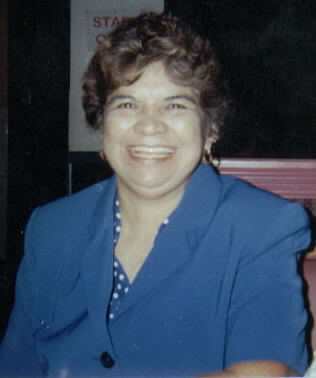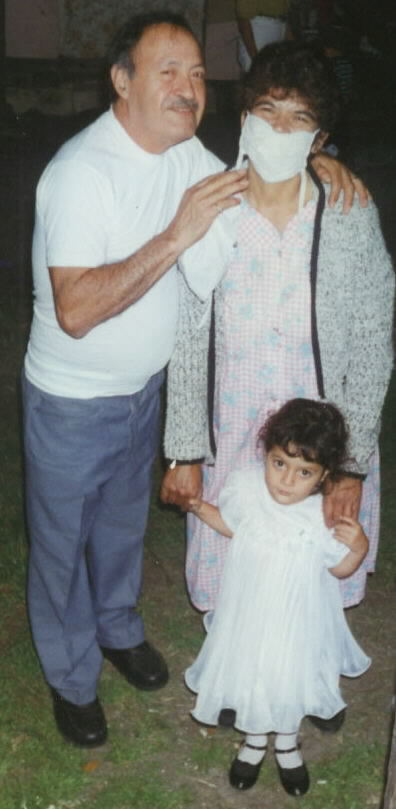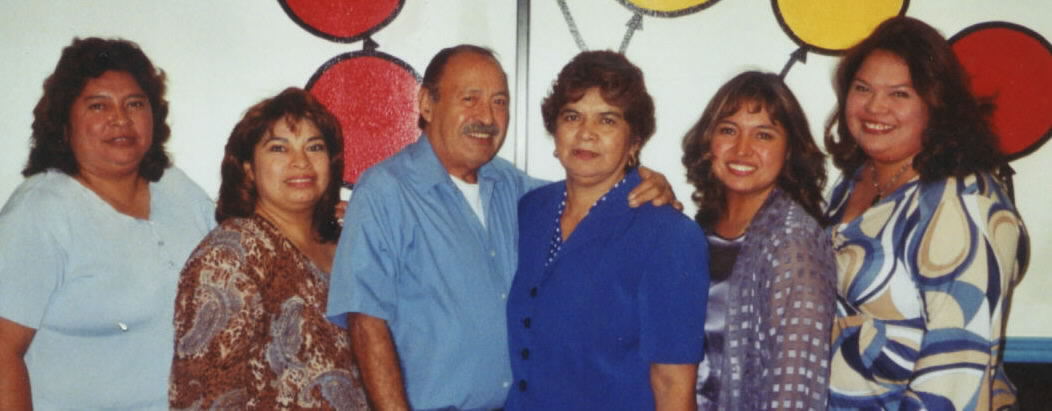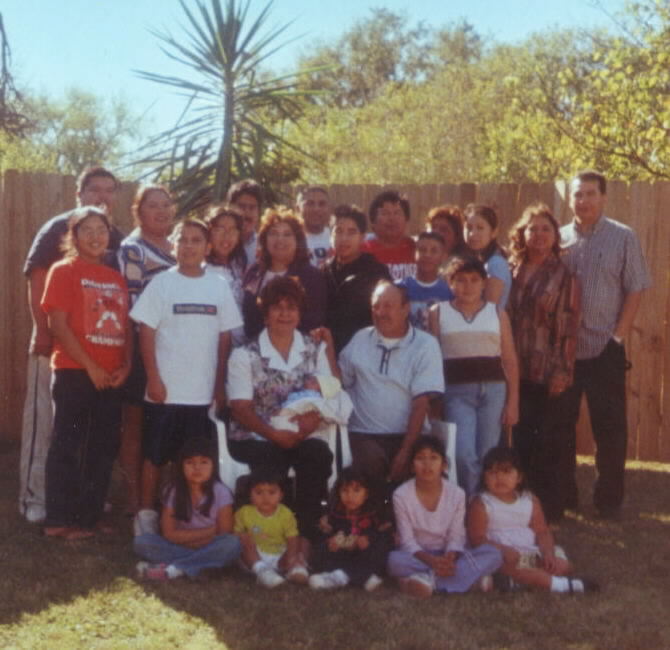Maria De La Luz Mancillas (nee De Luna)




My mother Maria De La Luz Mancillas was born in Allende Coahuila Mexico on October 13, 1943. She was the second child of four born to Cipriano De Luna and Maria De Jesus De Luna. Her family consisted of two sisters, Rosario the eldest (who died on March 16, 2003), Candelaria the youngest and one brother, Vicente who was the third child being born to the family. As a child she attended a school called Benito Juarez. By the age of nine, she began her first job after school as a housekeeping and babysitter. Her formal education level ended on the sixth grade. Aftern that, Maria went to live with Doctor Vega's family to work for them and help her family economically. Some of the work that her job consisted of was housekeeping, babysitting, sales clerk and pharmacist. By age 19 she stopped working for Doctor Vega to get married to my dad, Roque Barron Mancillas. They were married on November 10, 1962. Soon the family grew and two daughters were born, Mary and Nora. In the year 1965 the family moved to Saltillo Coahuila Mexico in search of a better life. Here is where Sandra (me) was born. A few years after they had left there, the factory Textil Del Norte where Roque had been working went into a strike. During this time Maria was pregnant from her forth child and while visiting relatives in Allende, she gave birth to her last daughter Alma. Finally, by 1974 Textil Del Norte closed. Being that there was no work and that the family had increased, Maria and Roque decided to migrate to the United States and in that year they arrived to San Antonio, Texas in search of a better life.
What do you remember about your childhood?
I remember that we lived in several houses until my parents bought a small shack (jacal), but before that we would pay rent where we lived.
Who provided for the family?
Papa worked in a ranch for a man named Neira, and that's how my father got his nickname (Neira).
What did he do in the ranch?
Papa took care of the animals and labor of the ranch.
Did grandma ever worked?
Papa got sick when Cande was born in 1947, that year papa got sick of rheumatism like arthritis that's how it got started and then he couldn't work no more. Mama washed, iron, did tamales, did blook sausage, did tortillas or whatever to sustain us. When she made tamales she would make two big cans and as soon as she finished she would clean-up and set a table with chairs and she would sell them with hot coffee.

Was rheumatism the cause for grandpa to get crippled?
Yes, he began with lots of pain in his legs and body cramp that got worst. I could hear him cry and shout at night. Papa stay in bed for three years mama would change his cloth and bathe him and take care of him. We had a chair that we dragged to move papa because we didn't have money for a wheelchair. After three years he begin to walk with crutches. But because we didn't have money to go to a doctor papa would go to many curanderos that would give him herbals to drink and tried this and that and after a while his arthritis became chronic and his bones began to pop out from his joints. Then after time when we were better economically we were able to buy him a wheelchair.
Did grandpa ever worked after his sickness?
Papa tried to help and began to sell. He had a basket where he carried fritos, gums, candies that he sold. Afterward he put a stand where he continued to sell his stuff and also refreshments like beers and sodas.
Who else helped economically?
My brother began to work at the age of 13 as a carpenter.
How did my grandparents manage to send you all to school?
We had family over here in the United States. Mama had several brothers and sisters who had gotten married in the United States, so when we were going to start school they would help her to pay the books they would send her boxes of clothe, shoes and they would help her with money to put us in school.
Did my grandma lived in the United States before or how did their brothers and sisters wed in the United States?
Yes, mama lived in the United States during the Mexican Revolution from the age of 14 until she was 24. Then the family left back to Allende. Only the ones that got married are the ones that stayed in the United States.
When did you begin to work?
I begin to work when I was nine years old. I was in third grade and I would go in the evenings or on Saturday or Sunday and I would help a lady named Mine clean, sweep, mop, wash dishes and baby-sit. Then Mine came over here to San Antonio and she wanted me to come with her, but your grandparents didn't let me. Then as soon as I got out of sixth grade, when I was 13 years old I began to work with Doctor Vega. I went to live in his house with his family. They had a clothe and shoe store, they had a pharmacy and they also took x-rays. I began to baby-sit their children. Their daughters got very attached to me, they loved me very much that they would call me mom. After a while, I also begin to helped in the pharmacy. I would wash the things of the pharmacy and I learned to take x-rays in the laboratory and also helped them in the clothe and shoe store. They trusted me alot that when they went out of town I would stay to take care of their house.
So what kind of childhood did you have if you worked being a child yourself?
Well, it wasn't that hard because I loved the children and I really got attached to them and I would help my family economically.
Do you remember a special event, or holiday that you use to enjoy when you lived with my grandparents?
I remember in Christmas we would put a sock and they would put us peanuts and candies.
Was that all you received?
Yes, we were happy united
Was grandpa ever strict with you?
He was strict but with me he was more understanding. For the same reason that I worked away from home, when I came home he would give us permission to go to the dance. I would go home every month, every third week and I really kind of felt stange in my own house because I had gotten used to living in Doctor Vega's home. At first it was hard when I began to work. I remember that I didn't even know where the light switches were. The Doctor and his wife Verenice would go out to parties and they would leave me with the children. I would cry at night because it was hard to be far from home then I got used to it.
Where did you met dad?
Two houses from where I worked ,Esteban Barron a cousin of your father, had a fruit store and there is where we would go for the fruit for the Doctor's house. Your dad would go visit his cousin often and there is where I met him.
How long did you dated before you got married?
More than two years. Your dad would come to the United States to work and he came like two times then we got married.
Did he use to come illegal?
He had a visa.
Once you got married why did you stopped working?
Because in that time women would stop working once they got married and stay home to raise their family.

Once you got married how did your life changed?
After living with Doctor Vega's family for six years, I was very use to them. Right afterI got married they wanted me to stay working with them and that they would give me a furnished house and everything, but your father didn't want. We went to leave with my mother in law. She was very nice to me. We leaved with her for 13 months and after my first baby was born we moved from her house.
After you left from your mother in-law's house where did you moved to?
We lived in Allende. We lived for three years and a half in Allende, then we moved to Saltillo.
Why did you moved to Saltillo?
Because the Textile was moved to Saltillo. The fabric had burned in Allende so they moved to Saltillo. All the textile employees followed the company.
Did you rent a house or where did you all lived?
Yes, we rented a house right in the middle of downtown. The street name was called Aldama. There was a theater and there was a lot of traffic in that street and many stores. There was an ice cream shop in front of where we lived. Right as you entered through a small door there were two stores on the sides. As you opened the door there was a long hall of mosaic and inside there were houses like apartments and there is where we lived.
How long did you live there?
We lived there until we made a house by the Colonia Virreyes, like about one year I think. We bought a lot and we made the house there.
Who constructed the house?
Some masons that we hired did some small rooms and we moved in without them being completely finished. Within time your dad attached more rooms to the house. Do you remember that we moved in front so that your dad could put the floor and finish the walls and put some concrete roof, then we moved back? Some rooms were not completed because we came over here and when we went back we left some money so they could finish the house.
What were your happiest moments after you got married?
Well, for me my happiness were my daughters, because I always liked children and I thought that maybe I would never get married and that God was never going to give me children, because I really wanted some children. So my happiest moment was when my first child was born.
Did you stay with the desire of having a boy?
Yes, I stayed with the desire only because of your dad. He would always say, "another girl!" but I was happy with my daughters and now I have my grandsons, granddaughters and great-grandson and I think God has given me life to enjoy my family, it is what I most love.
What were your goals for your family?
I wanted to get you all ahead to progress to study. What I myself couldn't do. Many times I wanted to study at least an academic or trade course, but I never mentioned it to the people I worked for. Maybe if I would have told them they would be able to help me, but I was very shy and I never told them. I always even thought of working here in the United States and when you all would grow-up to go back and for you all to study a career in Mexico.
Why did you migrate to the United States?
For a better future and for lack of work, also becasue the Textile had closed.
Weren't you afraid to come to the United States?
No, I was the one to process the documents for the tourist visa and your dad would ask me "why do you want your visa?" and I would tell him "so that maybe one day if we go to Allende we could go shopping to Eagle Pass." But in reality I never thought we would come and when he was going to come and leave us in Allende I told him "I am coming with you! If they give us a permit I will go with you and if they don't allow the girls in school I will return" and that was my intention. But thanks God we got here in a Thursday, and by Tuesday we already were living in a small apartment. In Monday your dad had already been employed in Roeglein and I didn't have any problem placing you all in school.
When we got here to San Antonio, how did you felt?
Well, we came to a relative's house as a visitor and if your dad would find work we were going to stay and since he did we stayed.
Did the United States change your culture?
In reality they had different customs, but I already have my roots and I would take care of you all the same as in Mexico. I wouldn't let you all go out by yourself. I would take you wherever you needed to go. Because always, the most important of a family is unity.
Did you work in many places in San Anonio?
I started to work in a restaurant, but until Alma the smallest entered school. First I worked in Linda's Tacos, and then in Mexicana Molino, Kroger, then Alberto's most were restaurants and tortilla factories. Until I worked in Levi Strauss & Co. for ten years. Until they closed it down and took it somewhere else. I also worked for San Antonio Press Co. and as a provider for Personal Touch Health Care Inc.
From every place you worked, which was the one you liked the most?
Well, the most productive was Levi Strauss & Co..
Why did they close Levi?
Because they took it somewhere else. But, they gave us unemployment and benefits and send us to school.
What kind of school did they gave you?
They send me to school and I obtained my G.E.D.

After time how were you able to stay in this country?
With the Amnesty of 1987.
Then when did you became a citizen?
In 1995.
How did you felt once you became a citizen?
Well, I felt more confident that I had more rights to be in the United States that I could now find a better job and that I wasn't a foreign person no more. I felt more secure also, because United States is a country of opportunities. Whoever wants to progress, by basis of sacrifices they will progress and this governor offers you many opportunities. Because over there in Mexico even if you want to progress you can't. What most satisfied me was like in Levi Strauss they paid well, they are not seeing where you are from, if you do your work well they are going to pay you for what you do not for your race, color or gender.
What has been your major illness?
Liver Cirrhosis. I obtained a Liver Transplant.

What were the symptoms you had?
My legs were getting dark and they use to hurt a lot and I felt very sick. I was loosing memory and I would move very slow and I would often receive blood transfusions and the doctor couldn't find out what I had. One occasion when I really lost my memory and my blood counts where very low, I was hospitalized and that's when the doctors did the scan and found out I had cirrhosis.
What was your reaction when the doctors actually told you that you needed a liver transplant?
I didn't want the transplant I thought that I wouldn't make it because of the diabetes and because it is not easy to accept a transplant from someone else because even the doctor told me that in a transplant when you receive an organ that is not yours there might be a rejection but also to others who have already received it they were doing fine. Since I had already known the Lord, I thought that if God gave me life to give it to me until he wanted. First of all, the doctors placed me in a waiting list. Thanks God that everything went well, after I obtained the transplant, because they would only give me two years of life before the transplant, and after the transplant I was home be the eighth day. Before the transplant I would pray to God that if it was his will, to give me the opportunity to live longer. Then one day in Valentine's Day (Feb. 14, 1997) they called me that the donor had arrived. So they told me to be ready in one hour, and if I didn't go they would give it to someone else that might need it. Therefore that is when I decided to continue with the process, because the opportunities were being presented to me and I knew that God was opening doors. If this would have been occuring to me in Mexico, well I probably would have died already.
What has been your greatest accomplishment or goals?
Having the transplant was new life because I wouldn't have leaved without the transplant and obtaining my G.E.D. and becoming a citizen.
What has been the happiest moments since you lived here in San Antonio?
Graduations of all my daughters. The weddings of you all, being married to wonderful men and enjoying my grandson, granddaughters and great-grandson.

Anything you want to add?
I fill that if I could leave you all one inheritance when I die it would be the path of the Lord. This inheritance is greater than gold or money, because no matter what struggles you might encounter through life, with the love of the Lord you could overcome any obsticles and when someone has the love and fear of the Lord they won't do bad things. When you are in the Lord's path you raise your family with moral, with the love of God.

This interview has uncovered many hidden history from my family. By doing this interview I discovered the deepest thoughts and feelings of my mother. I discovered the sorrows, struggles and sacrifices that my mother went through her life. Also, her happiest moments, triumphs and goal's reached. My topic on immigration has made me realized that coming to a new country is not easy especially when you encounter different language, culture and most of all leaving behind your loved ones. It has made me comprehend why so many people come to the United States sacrificing their lifes. Besides being a free country, United States is also a country of opportunities. My mother and father took that big step of coming to America so that my sisters and I could have these opportunities. Learning about the past through the interview process helps us understand the reasons why people act certain ways. Being that my mother came from a low economic family, has made her understand the needs of the poor. Each time my mother travels to Mexico she takes many articles such as food, cloth, toys etc... and distributes them to the needy. In conclusion, I also believe that every person have gone through different experiences and different situations, this oral histories are the ones that have also helped in modifying laws, improving technology and investigating science. Therefore, without oral history valuable information may disappear forever.
Allende Coahuila Mexico. A map of Mexico located on multimap.com. Allende can be found on the map southwest of Eagle Pass, Texas.
curanderos. Jose S. Graham. The defenition can be found on the Handbook Of Texas Online. Curanderos are healers who practice folk medicine and are most practiced in hispanic cultures.
Mexican Revolution. Cindy Baxman. This site provides the history of the Mexican Revolution 1910-1920.
Levi Strauss & Co.. This site provides the global overview of Levi's Strauss & Co. Founded since 1853, Levi Strauss have been allover the world providing employments, satisfying consumers and devoting substantial time and resources to charitable and philanthopic activities.
Amnesty of 1987. (USCIS) U.S. Citizenship and Immigration Services. This site provides information about the Amnesty that took place in May of 1987. President Ronald Reagan had signed the (IRCA) Immigration Reform and Control Act that became a bill into law.
Liver Transplant. This site provided from MEDLINEplus offers you crucial information about Liver Transplantation.